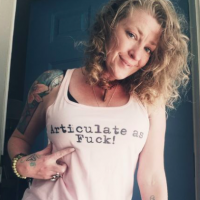
*Warning: salty language ahead.
“You’re a woman, you can hold this hurt,” the voice says to me.
“Who the fuck are you?” I wonder. “And how did you get so deeply ingrained in my brain?”
When I feel hurt, my first concern used to be for the person who was hurting me—to make sure they are okay. I’m breaking this pattern.
Yes, I care. It is one of my most charming, most human qualities, but it can also be a place I slip, trip, and wind up hurting myself. How can caring leave me hurting? I tend to look for humanity so much in other people at times, that I overlook some very basic elements of my own. That is fundamentally, my own pain.
I got good at covering it up—my pain. That’s what I tend to do with those micro-infractions, and then it gets easier, and easier to do with the bigger wounds, too. Or maybe it started with a bigger wound, some ache in my young psyche that I was not resourced enough to deal with, that I had to bury to keep going. The point is, I have practiced this for a long time and I’m fucking over it.
When I was young, I believed if the people around me saw me cry when they hurt me, then they would know how to do it again. Not exactly a good formula for vulnerability.
I internalized this strategy and did not cry for years. I could get mad. I could stand up for myself, but telling someone they were hurting me—no fucking way! Even letting them see my pain seemed like I would be asking for more. So I got good at burying it, at swallowing my tears, my hurt, my confusion, and rage.
Rage was, probably, the safest thing to feel, as it was the most frequently expressed emotion in my split-household. Everyone had loads of unprocessed pain that came out as rage. Later, in my own young marriage, we found our passion for each other through sex—and rage. We were great at fucking, and we were great at fighting. We were not good at listening, at feeling, or at reassuring each other. It fit the model that was familiar.
Let’s break that word up, familiar—family. We tend to gravitate to what is known to us, and what is most ingrained in us are the patterns of interaction that we see and feel, modeled for us through our family of origin. This is true of our values, as well as how we navigate our emotions. We model behaviors more than we internalize what we are told, but we do both.
I don’t remember conversations about feelings in my family. I remember my mother rubbing my back, taking us on excursions, letting us run wild in the mountains. And I remember taking care of my younger brothers.
Structure is hard for me; it was not modeled to me, as a child. Mom told me the other day that she didn’t get the difference between authoritarianism and structure. Me neither. Boundaries have been hard to learn, but I am getting there.
Mom and I have worked to repair and build our relationship. It’s a connection that centers around our shared dedication to our Earth Mama, to being mature, accountable for our emotions and behaviors, and communicating clearly and honestly—no matter what.
She did not model this for me—we’ve learned it together, as adults.
Communication is the thing that I value the most in this world. It’s easy to talk about the things that make us happy, things we want, things that we feel proud about, or accomplished. It’s hard to talk about pain and confusion. It’s hard to talk about hurt. Pain is not what I most want to talk about—but opening up to it is usually what is most needed for other things to flow.
I love to flirt, it’s part of how I communicate. Not just with the opposite sex, but with life. It’s a style of engagement that is bubbly, genuine, and playful. When I’m anxious, when I’m hurting, or angry, and holding it in, my flirt game is all but nonexistent. I twist and writhe around what I want to say. I spurt and over function, especially in intimate dynamics. I focus too much on the other person’s stress, and pain, and minimize mine.
That might look like someone saying something like: “I feel like I owe you an apology.” And me without even thinking, feeling, or letting it in, saying something like, “You don’t ever have to apologize to me for needing to take care of your life.” Which is true—and is me, also effectively, bypassing my pain to let them off the hook for disappointing me.
Here’s the rub: I didn’t even know I was hurt.
Some say that we are only hurt by our own expectations. That is true to a certain degree, but it is not the whole story. We should have expectations of others. We should expect them to be kind, decent, honest, and fucking communicate about what’s going on, so we know where we stand. That is my hope, anyway. It’s not what I grew up with, and it’s something that at almost 40, I am beginning to get clear about. I’m still learning how to listen to myself when those hurts or needs arise, and then speak them honestly with the ones who matter—and it gets messy.
People who grow up in unstable environments tend to form various forms of dysfunctional attachment styles. Mine is an anxious attachment. As soon as I feel attracted to someone, as soon as I start to open that energy, in myself, and share it with another, I’m pretty much convinced that they are going to leave me. That I will be too much, my needs won’t matter, my feelings won’t matter—that all I’m cut out for is being used and abandoned.
As I reach out, I simultaneously tell myself, “I am doing it wrong.” When I share what I’m feeling, or needing, or if I say something flirty, or god forbid, sexy—my whole brain conspires to convince me it was too much.
As we get closer, I tend to associate my value with what I can offer them. Now, this is particularly absurd with someone I am sharing my body with. Getting to go to bed with me is a fucking privilege. All the care and sensuality that I bring to life, I pour into lovemaking, into a lover, into the man who is with me, in me. It is a gawd-blessed, fucking gift.
I am enough—more than enough, never too much—messy, sweet, tender, and sexy, hurting, or whole. No epic, or even micro-sacrifices, needed. I’m fucking done being a martyr.
~










Read 25 comments and reply